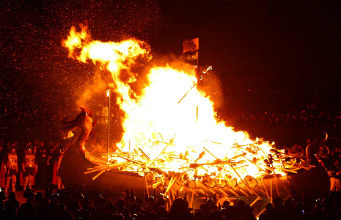Did the Vikings Really Burn Ships During a Funeral?
While a burning ship certainly has a flare for the dramatic, the actual practice of ship burning may have never existed. Most of what we know about the funeral practices of the Vikings comes from archeological digs: thus a burning ship in open water is a rather improbable piece of evidence to be found. Concerning the true and well understood funeral practices of the Norse, we do know that they often buried ships. Archeologists have removed from the ground several fine specimens including the Gokstad and Osberg ships (the most famous of them all). Where then did the idea of ship burning originate?
First we must look at the evidence we have to examine. None of the Christian Chroniclers have ever mentioned burning ships, nor did they spend any measurable time examining the funeral practices of their heathen counterparts. Luckily, Christian Chroniclers are not the only written sources on Norse culture. Ibn Fadlan, an arabic chronicler of the 9th century, travelled north through modern Turkey and into the lands known as the Land of the Hazaars (distant relatives of the huns). There he encountered a different culture he had not anticipated to find. Through trade and the facile accessibility provided by the designs of their ships, Swedish Vikings known as the Rus had navigated across Eastern Europe as far as the Black Sea. Ibn Fadlan spent a reasonable amount of time living among the Rus and wrote meticulous notes on their cultural practices. In these notes, Ibn Fadlan wrote of the burning of ships during the funeral of a king. It is from his accounts that historians decided that this must have been a common practice among all Vikings. Unfortunately, there are too many questions left unanswered such as: why is this the only account? Why are all the other burials in Scandinavia of buried ships? Could the Rus have improvised the burning ship for lack of access to their normal practices? Burning a ship leaves no evidence behind, and thus it cannot be disproven just as it cannot be definitively proven. Perhaps evidence will come to light in the near future; perhaps it will be found by you.
Study History.
Like the Vikings? Try this book.






